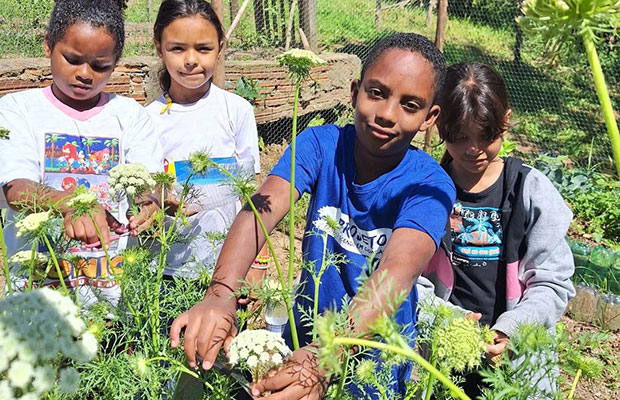
Cultivating Sustainable Futures in Brazil
Ever since its original inhabitants first began farming the land, “Brazil” and “agriculture” have been nearly synonymous. The country’s rich soil, copious water, and abundant sunshine make farming a viable economic choice for both small family enterprises and large industrial operations. That’s one reason why Salesian missionaries in São Paulo work to cultivate connections with the land among impoverished urban youth.
“It’s true nearly everywhere—even here in the United States—that the further away people get from fresh, healthy food, the more they risk obesity and other chronic diseases,” says Father Michael Conway, director of Salesian Missions. “Living a fast-paced, city lifestyle is one reason people might choose nutritionally poor food as it tends to be more convenient,” he explains. “But poverty is an even stronger driver—because processed food is cheaper.”
Students at the Salesian-run Recanto da Cruz Grande school in Itapevi fall into both categories: their feet are firmly planted on concrete rather than in the soil; and their backgrounds are deeply rooted in poverty. But a new gardening project is helping to sow the seeds for healthier futures—for them, their communities, and the environment, too.
For the past several months, these elementary students have been learning how to grow their own gardens for food. They have prepared the soil, nurtured the seedlings, transplanted the sprouts, and watched with excitement as their vegetables thrived.
After harvesting what they grew, ”the students washed the food and gave it to the school kitchen staff, who lovingly prepared a special dish so they could taste what they themselves had planted,” reports one of the Salesian educators involved in the project. “The aim is to encourage healthier eating and teach youth to work with, respect and cultivate the environment.”
Recanto da Cruz Grande offers education and socio-educational activities for children and adolescents ages 6 to 17 in the region. The gardening project fits in with the school’s mission to empower at-risk youth and strengthen family ties through education. It’s also part of a broader initiative known as “Growing in Citizenship.”
Inspired by Pope Francis’ Laudato Si, this initiative helps youth better understand and develop their personal role in caring for their local and global environment. By tending their gardens from planting to harvesting, they learn the relationship among soil, water and nutrients; they learn sustainable cultivation techniques and how to compost; and they contribute to the fight against hunger by focusing on community-scale production for local families.
As their teacher Rosiene says, “Being part of this project is an opportunity for me to be a contributing and better citizen.”
Learn more about our work in Brazil.
Our mission teaches students the agricultural and sustainable skills needed to benefit entire communities. What’s your mission?

